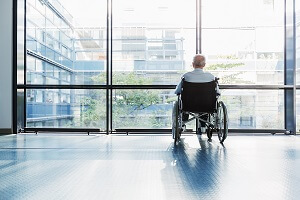 Our elderly loved ones are at great risk of abuse when they are in the care of others, particularly at nursing homes. Many Georgia nursing homes are providing poor care to their residents – in 2016, 27.6 percent of facilities in the state received one-star quality ratings. These overall ratings combine ratings on health inspections, staffing and quality of care.
Our elderly loved ones are at great risk of abuse when they are in the care of others, particularly at nursing homes. Many Georgia nursing homes are providing poor care to their residents – in 2016, 27.6 percent of facilities in the state received one-star quality ratings. These overall ratings combine ratings on health inspections, staffing and quality of care.
If your loved one is in a nursing home, there are certain signs you can look for to determine if he or she is being abused. There are also some risk factors that might make your loved one more likely to suffer abuse or neglect.
The experienced Savannah nursing home abuse attorneys at Roden Law want your loved one to stay safe. If you suspect that your elderly loved one is a victim of abuse in their nursing home facility, you can contact us to talk about what is going on and whether or not you can take legal action against the facility or its staff members.
Types of Abuse
There are several different forms of abuse that may occur in your loved one’s nursing home:
Physical
Physical abuse can include serious forms of violence, including assault and battery. Sometimes residents are slapped, pushed, punched or kicked. Physical abuse can also involve the improper use of restraints or controlling a patient through medication.
Emotional
Emotional abuse involves insulting, demeaning, berating, criticizing, yelling at or attempting to humiliate or cause fear in the nursing home patient.
Sexual
Sexual abuse involves unwanted sexual contact or sexual contact with a resident who does not have the mental capacity to consent.
Neglect
Neglect consists of not providing the proper care or nutrition to nursing home residents, such as not withholding food or other basic need or ignoring the resident by leaving him or her alone for a long period of time.
Symptoms of Abuse
It is not always easy to spot signs of nursing home abuse or neglect. However, in the case of physical abuse, warning signs are a little more apparent and may include the following:
- The presence of unexplained broken bones, sprains or other injuries
- Unexplained bruising
- Improper use of medication
- Signs of improper use of restraints, such as welts or redness on the legs or wrists
- Broken eyeglasses
- The refusal of a caregiver to allow a loved one to be alone with the elderly person
Although it is often difficult to identify emotional abuse, some possible signs to look out for include:
- Unusual behavior, such as mumbling, rocking back and forth, or sucking a thumb
- Listlessness or unresponsiveness
- Emotional withdrawal
- Fear of being alone with nursing home staff
Signs of sexual abuse include the following:
- Reports of sexual contact
- Bloody or soiled bedding or undergarments
- Bruising near private areas
- Unexplained STDs
- Torn, stained or bloody clothing
Neglect may be occurring if you notice these warning signs:
- Poor hygiene
- Soiled clothing and bedding
- The presence of bedsores
- Stench caused from lack of bathing
- Lack of medicine, assistive devices, heat, electricity or food
- Unusual weight loss or dehydration
Who Is Most at Risk of Abuse?
Elderly individuals who have additional needs may be at a greater risk of abuse. Individuals who have cognitive problems may be targeted because they may not be able to provide information about abuse. Elderly individuals who are isolated and do not have relatives who regularly check on them are also at an increased risk for abuse.
Patients who are paired with potentially problematic caregivers are also at risk of abuse. Warning signs about caregivers include the following:
- A history of previous abuse
- A lack of proper training
- Frequent job changes
- Alcohol or drug abuse
- Having minimal support from others at the facility
- Depression or other mental health issues
- High-stress work environment
Contact Us for a No-Cost Legal Consultation
If you suspect nursing home abuse, it is important that you report your suspicions so that the abuse can come to an end. Then, contact an experienced nursing home abuse attorney from Roden Law to explore your legal options. Our attorneys will work closely with you to determine the ways that you can protect your loved one and seek compensation for damages.
We charge no upfront fees and work on a contingency fee basis, so there is no risk to contact us to learn about your elderly love one’s rights. Contact us today to schedule a free case review.
